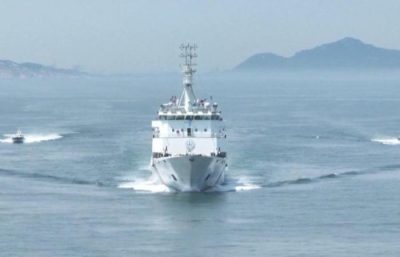EU Navies to Face Off China Over Taiwan

All Global Research articles can be read in 51 languages by activating the Translate Website button below the author’s name.
To receive Global Research’s Daily Newsletter (selected articles), click here.
Click the share button above to email/forward this article to your friends and colleagues. Follow us on Instagram and Twitter and subscribe to our Telegram Channel. Feel free to repost and share widely Global Research articles.
***
In yet another move set to cement the European Union’s status as a geopolitical pendant of the United States, its foreign policy chief Josep Borrell openly stated that he wants the armed forces (or, in this particular case, navies) of EU countries to patrol the increasingly contested Taiwan Strait to “help protect” Taiwan. Borrell gave a more detailed account of the plan for the first time in an opinion piece he authored for the French weekly Journal Du Dimanche. He insisted that the “peace and stability” of China’s breakaway island province is of “crucial importance” for the EU. Borrell also added that the island “concerns us economically, commercially and technologically” and reiterated the “urgency for the EU navies to ensure its protection”.
Borrell’s exact words were: “I call on [the EU] navies to patrol the Taiwan Strait to show Europe’s commitment to freedom of navigation in this absolutely crucial area.”
This comes mere days after a delegation from the US, including the bulk of its MIC (Military Industrial Complex) announced they would visit Taiwan and “discuss its defense”. Even more interestingly, Borrell mentioned “the economic, commercial and technological importance” of Taiwan, which falls perfectly in line with what a Republican congressman from Texas, Michael McCaul, recently said on air with Chuck Todd of NBC’s Meet the Press, when asked about why the US should “defend Taiwan”. McCaul bluntly stated that the US would go to war over China’s breakaway island province on the basis of “protecting the world’s semiconductor supply“, although he was quick to revert to the official narrative after Todd tried to clarify it.
However, Borrell’s comments are significantly more consequential, as McCaul, despite his extremely powerful position as the chairman of the House Foreign Affairs Committee, doesn’t directly shape the US foreign policy. On the other hand, Borrell is one of the troubled bloc’s top officials and such statements will surely not be taken too kindly in Beijing. China has never meddled in the internal affairs of a single EU member state, in stark contrast to Brussels. For its part, the EU has directly meddled (and still does) in the questions of Hong Kong, Xinjiang and now Taiwan. All three areas are China’s provinces with varying degrees of autonomy and Beijing (rightfully) considers them to be a matter of its internal affairs.
Borrell’s controversial (at best) statements seem to be indicative of a major (and rapidly growing) divide between the EU as a (geo)political entity and its top member states. The EU’s head diplomat might have been seeking a counterargument to French President Emmanuel Macron’s recently revealed stance voiced earlier in the month that boils down to the EU essentially minding its own business, taking care of its own numerous issues and just leaving China alone. At the time, coming off a visit to Beijing where he met with the Chinese leadership, including President Xi Jinping himself, Macron had stressed that Europe must not be “a direct vassal” of US policy on Taiwan and that it has to achieve the goal of its own “strategic autonomy”.
“The paradox would be that, overcome with panic, we believe we are just America’s followers,” Macron stated, adding: “The question Europeans need to answer … is it in our interest to accelerate [a crisis] on Taiwan? No. The worst thing would be to think that we Europeans must become followers on this topic and take our cue from the US agenda and a Chinese overreaction… …If the tensions between the two superpowers heat up… …we won’t have the time nor the resources to finance our strategic autonomy and we will become vassals.”
The traditionally Russophobic Poland took this as a sign of “capitulating” to “Putin’s ally” China, as Warsaw is a staunch supporter of US interests in the EU. Recently, Polish Prime Minister Mateusz Morawiecki slammed Macron’s “controversial” comments on Beijing, made just after he met Xi Jinping. At the time, Morawiecki openly mocked the French President’s call for “strategic autonomy”. And while Macron’s stance can hardly ever be considered “pro-Chinese” (provided he even had honest intentions), still, even a semblance of anything that could remotely be seen as “anti-American” is virtual “heresy” in Warsaw. As previously mentioned, this only reinforces the notion of just how divided the EU is.
Obviously, as already stated, Borrell’s comments serve to counterbalance Macron’s stance, but the way in which the EU’s top diplomat chose to do that is as geopolitically unwise as it could possibly be. How is Beijing supposed to react to such rhetoric, particularly in light of US plans to deliver 400 anti-ship missiles to the government in Taipei and accelerate the delivery of over $19 billion worth of other weapons? And this is to say nothing of the effective forming of a “global NATO” or at the very least its Asia-Pacific version in the form of AUKUS, which at some point might even see more active participation of other US vassals and satellite states, including the EU itself. Coupled with NATO aggression against Russia, calling the foreign policy framework of the political West unwise can only be described as an understatement.
*
Note to readers: Please click the share button above. Follow us on Instagram and Twitter and subscribe to our Telegram Channel. Feel free to repost and share widely Global Research articles.
Drago Bosnic is an independent geopolitical and military analyst.
Featured image is from InfoBrics

